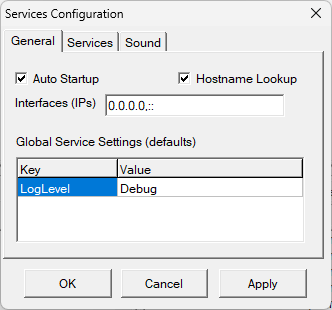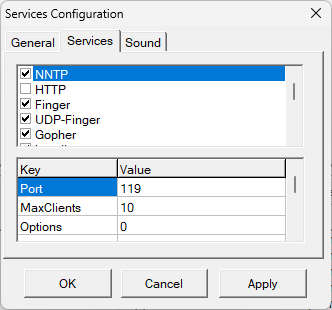Table of Contents
Services
Synchronet Services1) are loadable modules or external executables designed to be loaded by the Synchronet Services Server to service a particular TCP or UDP protocol for remote client connections. Synchronet Services are similar in concept to UNIX's [x]inetd services.
Configure
The Services Server can be configured via SCFG:Servers->Services Server:
╔══════════════════════════════════════════════╗ ║ Services Server ║ ╠══════════════════════════════════════════════╣ ║ │Enabled Yes ║ ║ │Log Level Informational ║ ║ │Network Interfaces 0.0.0.0, :: ║ ║ │Lookup Client Hostname No ║ ║ │Configuration File services.ini ║ ║ │JavaScript Settings... ║ ║ │Failed Login Attempts... ║ ╚══════════════════════════════════════════════╝
... or (on Windows) via SBBSCTRL:Services->Configure:
... or by editing the [Services] section of the ctrl/sbbs.ini file.
Services
Services are normally configured via the ctrl/services.ini file with some global settings controlled via the [Services] section of the sbbs.ini file.
... or (on Windows) via the “Services” tab of the SBBSCTRL:Services->Configure dialog:
Some static services (e.g. the IRC Daemon) may alternatively be executed independently of the Services Server using JSexec.
Service Types
There are four types of services currently supported:
- Dynamic JavaScript (the most common service type)
- Static JavaScript (e.g. the IRC Daemon)
- Dynamic Native
- Static Native
JavaScript Services
Additional methods and properties available to Synchronet Services written in JavaScript:
Properties
| Property | Type | Description |
|---|---|---|
logged_in | boolean | Indication if user has successfully authenticated or not |
datagram | string | Contents of received UDP datagram (when applicable) |
Methods
Along with the common global methods, JavaScript services include support for the following methods:
| Method | Returns | Usage | Description |
|---|---|---|---|
login | boolean | login(user, password [,increment_logins=false]) | Attempt to authenticate as specified user (name or number) |
logout | boolean | logout() | Logout currently authenticated user |
server.client_add | void | server.client_add(Socket, [user], [host]) | Register client based on specified socket connection, with optional username and hostname |
server.client_update | void | server.client_update(Socket, [user], [host]) | Update client based on specified socket connection, with optional username and hostname |
server.client_remove | void | server.client_remove(Socket) | Unregister client based on specified socket connection |

